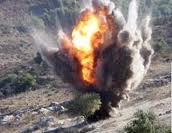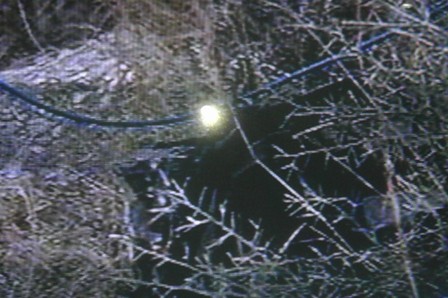Cluster-bomb activists visit army deminers

By Andrew Wander
Source: Daily Star, 13-11-2008
ZAWTAR: Delegates from an international conference on cluster munitions taking place in Beirut this week visited deminers from the Lebanese Army working in South Lebanon on Wednesday. A convoy of vehicles carried delegates from Beirut to Zawtar, an isolated village that was heavily bombarded by the "Israeli" military during the summer war of 2006. Lebanese Army deminers have been working to clear the area of unexploded cluster munitions since the conflict ended.
On a windswept hilltop outside the village that is still scattered with the deadly bomblets spread by cluster-bomb strikes, delegates watched the heavily protected deminers as they located and destroyed individual bomblets left over from the war.
Brigadier General Mohammad Fehmi, the director of Lebanon's mine-action center, was keen to emphasize that the area had been targeted despite not being used for military purposes during the conflict.
"This road was the only emergency exit road for civilians from Tyre," he said. "The bombing was against innocents, not against the military."
Deminers said they have found and destroyed around 3,000 bomblets on the hilltop site since the war finished. Their work is vital for allowing the villagers return to agricultural labor, upon which many rely and which they cannot do if the land is contaminated with unexploded weapons.
"This is an important thing to do because we have to prevent civilians getting hurt here," said Lieutenant Elias Hatem. "There have been civilians from the village hurt by cluster bombs. People are waiting to have the area cleared so they can start working again."
Hatem commands a team of eight deminers, three supervisers and an emergency medic. The deminers use specialized protective equipment and electronic sensors to detect the bomblets, which are often well camouflaged after two years of lying on the rocky brown earth.
Delegates from the conference were shown a bomb casing in which the submunitions are delivered, and watched as Hatem's team carried out a controlled explosion to destroy three bomblets that they had found earlier in the morning.
After visiting the deminers, delegates were taken to watch a mine-risk education session being conducted for schoolchildren in the village of Smaeeih, just outside Tyre.
Lebanese soldiers showed the children inert examples of different types of cluster munition and explained the dangers posed by unexploded ordnance. After the session the children were given small souvenirs to remind them of what they had learned.
Hussein al-Raaei, the mayor of the village, told The Daily Star that the education sessions were an invaluable tool in protecting the children. "Kids are always very curious and want to play with everything they find," he said. "It's very important for them to understand the dangers of these bombs."
The delegates' field trip bought to a close the two-day conference, which was attended by a military officials, NGO workers and mine-clearance experts ahead of the signing of a new treaty in Norway next month that will outlaw the use of cluster munitions.
The Oslo Convention will ban the production, trade and use of the weapons among countries that sign the treaty.
Source: Daily Star, 13-11-2008
ZAWTAR: Delegates from an international conference on cluster munitions taking place in Beirut this week visited deminers from the Lebanese Army working in South Lebanon on Wednesday. A convoy of vehicles carried delegates from Beirut to Zawtar, an isolated village that was heavily bombarded by the "Israeli" military during the summer war of 2006. Lebanese Army deminers have been working to clear the area of unexploded cluster munitions since the conflict ended.
On a windswept hilltop outside the village that is still scattered with the deadly bomblets spread by cluster-bomb strikes, delegates watched the heavily protected deminers as they located and destroyed individual bomblets left over from the war.
Brigadier General Mohammad Fehmi, the director of Lebanon's mine-action center, was keen to emphasize that the area had been targeted despite not being used for military purposes during the conflict.
"This road was the only emergency exit road for civilians from Tyre," he said. "The bombing was against innocents, not against the military."
Deminers said they have found and destroyed around 3,000 bomblets on the hilltop site since the war finished. Their work is vital for allowing the villagers return to agricultural labor, upon which many rely and which they cannot do if the land is contaminated with unexploded weapons.
"This is an important thing to do because we have to prevent civilians getting hurt here," said Lieutenant Elias Hatem. "There have been civilians from the village hurt by cluster bombs. People are waiting to have the area cleared so they can start working again."
Hatem commands a team of eight deminers, three supervisers and an emergency medic. The deminers use specialized protective equipment and electronic sensors to detect the bomblets, which are often well camouflaged after two years of lying on the rocky brown earth.
Delegates from the conference were shown a bomb casing in which the submunitions are delivered, and watched as Hatem's team carried out a controlled explosion to destroy three bomblets that they had found earlier in the morning.
After visiting the deminers, delegates were taken to watch a mine-risk education session being conducted for schoolchildren in the village of Smaeeih, just outside Tyre.
Lebanese soldiers showed the children inert examples of different types of cluster munition and explained the dangers posed by unexploded ordnance. After the session the children were given small souvenirs to remind them of what they had learned.
Hussein al-Raaei, the mayor of the village, told The Daily Star that the education sessions were an invaluable tool in protecting the children. "Kids are always very curious and want to play with everything they find," he said. "It's very important for them to understand the dangers of these bombs."
The delegates' field trip bought to a close the two-day conference, which was attended by a military officials, NGO workers and mine-clearance experts ahead of the signing of a new treaty in Norway next month that will outlaw the use of cluster munitions.
The Oslo Convention will ban the production, trade and use of the weapons among countries that sign the treaty.
- Related News



